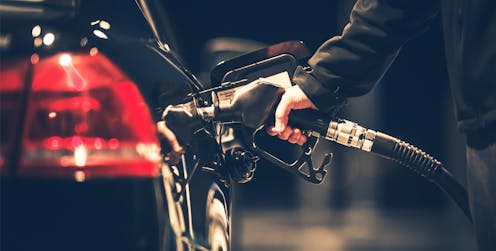What will the fuel excise cut save you? Not as much as the Treasurer says
- Written by John Hawkins, Senior Lecturer, Canberra School of Politics, Economics and Society and NATSEM, University of Canberra

As an appeal to middle Australia, to the voters politicians routinely describe as working families or battlers, the Morrison government’s centrepiece budget move[1] to halve the fuel excise for six months has obvious attractions.
“A family with two cars who fill up once a week could save around $30 a week or around $700 over the next six months,” declared Treasurer Josh Frydenberg on budget night[2], a point he’s repeated many times since[3].
But our calculations show most households, particularly those on lower incomes, won’t gain anything near the amount touted by Frydenberg.
At a cost of about $3 billion, cutting 22 cents in tax from every litre of petrol for six months will disproportionately help wealthy households. The economic gain is doubtful. Depending on what happens with the global oil prices, it may even contribute to inflationary pressures.
Who benefits most?
We’ve calculated the effects of the fuel excise cut on household budgets using a computer model[4] developed by the National Centre For Social And Economic Modelling[5].
Our results show the six-month cut to the fuel excise will save the average household in inner-urban areas of Sydney and Melbourne about $132. The average households in outer suburbs will save about $242. Those in the outer suburbs of smaller cities will save less as they need to drive shorter distances. The average household in rural and remote areas will save $194.
If oil prices drop the government will be adding billions of dollars to the deficit for no real economic gain. It could even be adding to underlying inflationary pressures by increasing household spending, pushing the Reserve Bank to increase interest rates[11] sooner or by more.
Furthermore, while the fuel excise cut is legislated to be in place just six months, history shows governments find it hard to reverse cuts once implemented. In 2001, for example, the government of John Howard was panicked by poor opinion polls to suspend indexation of the petrol excise when prices reached $1 a litre. Indexation was not restored for 14 years, at a cost of more than $40 billion[12] in forgone tax revenue.
Well distributed?
Economists prefer targeted measures, and the problem with cutting the fuel excise is that lot of the benefit will go to sustaining the driving habits of wealthier households.
On average those in the most affluent 40% of households drive about 50% more kilometres[13] than those in the poorest 40%.
Read more: 5 maps that show why free public transport benefits the affluent most[14]
Wealthier households are more likely to have second or third cars, and to have larger cars – such as SUVs – that use more petrol. They also have the money for leisure pursuits such as weekend getaways.
A better approach would be target help to businesses that must buy fuel and to those on low incomes, such as through a cash bonus, leaving it to them to decide if they want to spend on petrol or other things.
This would also help those without a car, those who do not drive much and those with electric vehicles, who all face cost pressures as petrol prices feed into prices at the supermarket.
References
- ^ budget move (theconversation.com)
- ^ on budget night (joshfrydenberg.com.au)
- ^ many times since (www.abc.net.au)
- ^ computer model (www.sciencedirect.com)
- ^ National Centre For Social And Economic Modelling (www.governanceinstitute.edu.au)
- ^ CC BY-ND (creativecommons.org)
- ^ Cut emissions, not petrol tax; fund childcare, not beer. What economists want from next week's budget (theconversation.com)
- ^ promoted (www.theguardian.com)
- ^ benchmark oil prices fell 13% (www.aljazeera.com)
- ^ its strategic reserves (theconversation.com)
- ^ the Reserve Bank to increase interest rates (www.afr.com)
- ^ more than $40 billion (australiainstitute.org.au)
- ^ 50% more kilometres (www.sciencedirect.com)
- ^ 5 maps that show why free public transport benefits the affluent most (theconversation.com)

















